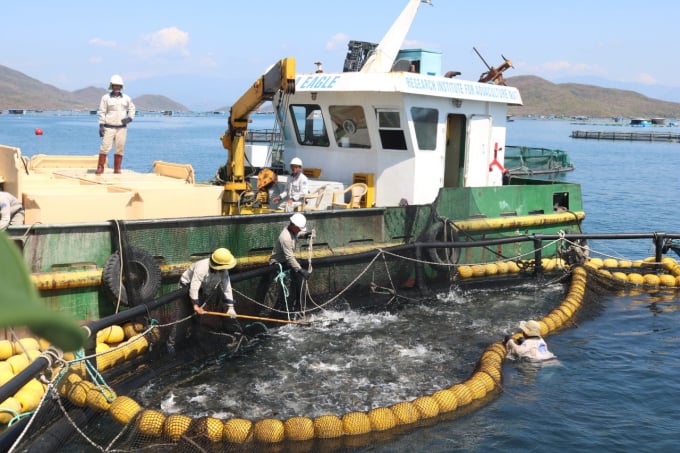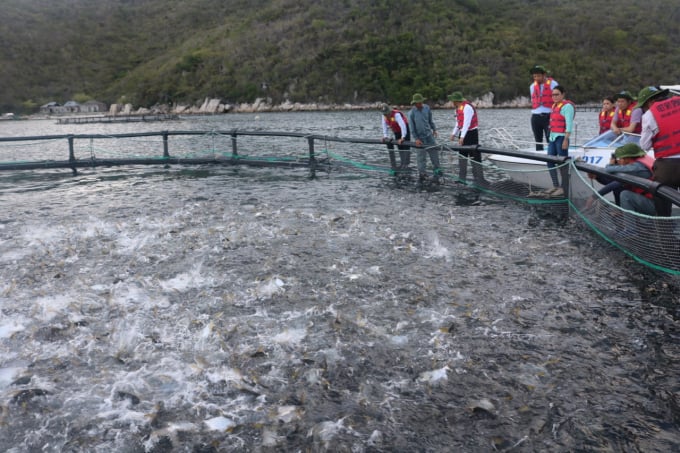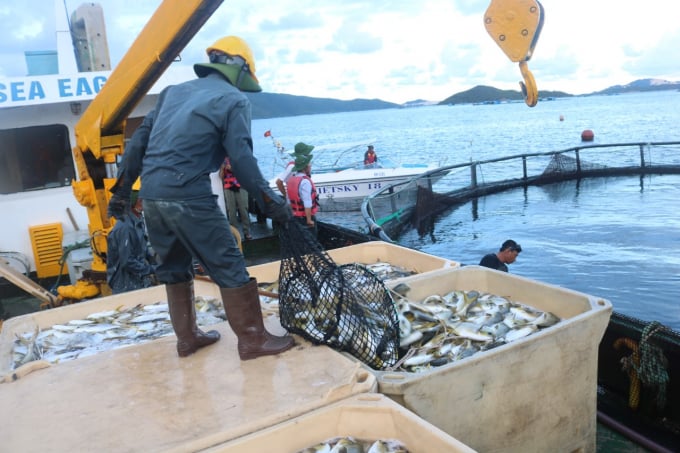June 19, 2025 | 05:22 GMT +7
June 19, 2025 | 05:22 GMT +7
Hotline: 0913.378.918
June 19, 2025 | 05:22 GMT +7
Hotline: 0913.378.918
A seminar on sustainable development of industrial seaculture in the central coastal province of Khanh Hoa took place in Nha Trang city on April 26.
The event was co-organised by the Vietnam Directorate of Fisheries, Vietnam Seaculture Association (VSA) and provincial authorities.
VSA Chairman Assoc. Prof. Dr. Nguyen Huu Dung, stressed the importance of aquaculture, especially marine fish farming, in the next ten years when exploitation will be reduced but farming production will be increased. Along with that, the small-scale spontaneous individual fishing occupation with outdated technology would be changed into a sustainable, high-tech, large-scale commercial fishery, in which enterprises are the subjects.

Industrial breeding of snubnose pompano in Van Phong Bay, Khanh Hoa Province. Photo: KS.
He said that such development can bring about many benefits to Khanh Hoa such as creating raw materials for the food, pharmaceutical, and fertilizer industries and helping people get rich from the sea, thereby enhancing the presence of fishermen at sea to protect the nation’s sea and islands sovereignty.
Le Tan Ban, Director of the Khanh Hoa Department of Agriculture and Rural Development, informed that local farmers mainly breed marine species near the shore and along islands within lagoons and bays. Most of them follow the traditional process, with their farming areas having a small scale and built from wood materials unable to withstand big waves.
He noted that Khanh Hoa targets the formation of high-tech, high-value-added, and disease-free seaculture areas; and the protection of the ecological environment in association with tourism growth and national defense, among others. The province's current solution is to build a project on sustainable high-tech seaculture development by 2030 with a vision toward 2045, which is expected to implement a number of pilot advanced models in open sea areas as a basis for replicating industrial seaculture in association with environmental protection.
Key missions set for Khanh Hoa now include investing in infrastructure and forming farming areas with the application of scientific and technological advances, he said.

Khanh Hoa Province aims to develop industrial aquaculture. Photo: MH.
Participants, including businemen and those from the Norwegian Embassy in Vietnam, shared their experience in the field, particularly regarding the sustainable and tourism aspects.
Addressing the seminar, Dinh Van Thieu, Vice Chairman of Khanh Hoa Provincial People's Committee said that the province would focus on marine planning to determine the marine farming area that is suitable for the adaptation of modern technologies while developing a project to gradually advance to industrial marine farming combined with tourism.
Speaking of supporting locals to convert wooden cages to HDPE cages to adapt to climate change and natural disasters, Thieu added that the province is currently developing a policy and assigning the Department of Agriculture and Rural Development to build a value chain from input to output for the sustainable development of industrial marine aquaculture.
Also at this seminar, the Vice Chairman of the province said that he would summarize the contents to propose to the Ministry of Agriculture and Rural Development, which aims to support the development of farm standards and businesses participating in insurance in the marine farming industry.

Khanh Hoa Province has the potential to develop industrial marine fish farming. Photo: KS.
Khanh Hoa Province wishes to continue to receive support from Vietnam Marine Farming Association on policies and experiences on marine aquaculture as well as on seeking domestic and foreign investors to deploy marine farming models with advanced technology and modern techniques; building a value chain for key marine aquaculture products, cooperating and training of high-quality human resources for industrial seaculture.
Relevant institutes and the universities are expected to continue to research and develop new technologies in marine aquaculture with the aim to enhance the added value of marine aquaculture. Meanwhile, businesses are encouraged to conduct further research to identify suitable farming areas in Khanh Hoa waters and propose investment ideas. If suitable, the province will update and integrate such ideas into its planning.
“Khanh Hoa Province always welcomes investment in marine farming. To businesses that have already invested in the province, they are expected to expand their scales and come up with measures to sustainably develop industrial seaculture in the locality further,” noted Thieu.
According to the Directorate of Fisheries, Vietnam has a 3,260-km coastline with a potential area of 500,000 ha for seaculture. In 2021, the country had about 7,447 seaculture establishments with 248,768 cages. Most of their products are exported to foreign markets.
Translated by Phuong Ha
/2025/06/17/3942-2-143243_548.jpg)
(VAN) Recently, in Sweden, the Secretary of the Binh Dinh Provincial Party Committee presented the Investment Registration Certificate for the 'Polyester Fabric Recycling Complex' project to SYRE Impact-AB Company.
/2025/06/12/3721-2-202745_83.jpg)
(VAN) TH made an impression at Seoul Food 2025 with its line of natural beverages, paving the way for Vietnamese food products to enter the South Korean market.

(VAN) Soc Trang's success in rice exports stems from a strategy of developing fragrant and specialty rice cultivation areas and standardizing production toward low-emission practices.
/2025/06/11/1311-5-120811_839.jpg)
(VAN) The pig farming industry is facing the challenge of comprehensive restructuring to meet requirements for quality, safety, traceability, and market expansion both domestically and for export.

(VAN) Vietnam considers participating in ALGROALBA in order to expand agricultural production, coordinate the assessment and effective exploitation potential land.
/2025/06/05/5314-1-184727_407.jpg)
(VAN) From seemingly worthless fish scales and skin, enzymes and lactic ferments can transform by-products into peptides, opening a sustainable, effective business direction and elevating Vietnamese seafood.

(VAN) TTC AgriS and IFC signed a strategic partnership to develop a sustainable agricultural value chain, aiming to achieve the Net Zero target by 2035.